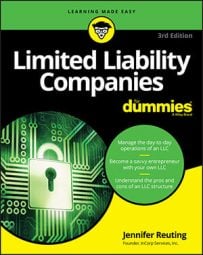The conversion to an LLC (limited liability company) from a general or limited partnership is probably as straightforward a switch as you can get. No matter whether you’re a general partnership, limited partnership, or limited liability company electing partnership taxation — you’re all the same in the eyes of the IRS.
The states may treat the entity types differently, especially when it comes to liability protection; however, they are all subject to partnership taxation.
Keep in mind that before you can convert your general partnership operation to an LLC, all the partners must unanimously agree to the decision. You can’t convert without them knowing it! All the partners usually have to sign off on it in the company’s operating agreement.
The big nontaxable event
Assuming that everything is straightforward, a conversion from a general or limited partnership to an LLC is a nontaxable event, so you won’t get hit with a big tax bill at year’s end. All you have to do is contribute the assets of your current business to the new LLC in exchange for membership shares. Most of this is done in your operating agreement.
This easy step makes converting from a general partnership or limited partnership to an LLC a relatively pain-free process. You simply execute the conversion with the state. As long as nothing changes in regard to ownership percentages or business debt, nothing changes with the IRS. You can have the same tax year-end and continue to be taxed as a partnership with the same year-end filings due.
It gets even better: Under Section 721 of the Internal Revenue Code, you’re allowed a friendly little exemption for any appreciation that your business property may have accrued.
For instance, if your limited partnership purchased a piece of property five years ago for $100,000 and it is now worth $150,000, when you convert the limited partnership to an LLC, you don’t have to recognize the new fair-market value of the property ($150,000) or pay taxes on the $50,000 appreciation that your property accrued over the past five years. The IRS allows you to put off that burden for later years, when you legitimately sell the property.
The usual partnership tax trap
The entire conversion is absolutely, 100 percent tax-free? It sounds too good to be true! Well, yeah . . . about that . . . . As with sole proprietors who may be looking to bring on another partner, if your business adds or removes members or changes any percentage of ownership during the conversion process, you may end up with some pretty gnarly tax consequences.
The same problem occurs if you change who is personally responsible for the business debt. If an owner personally guarantees a business loan, that loan is considered recourse debt, and the owner can use it as a deduction of sorts against any income he derives from the partnership.
If, when converting to an LLC, this partner changes the amount of debt he personally guarantees or writes it off entirely, the IRS likely will consider it to be income to the partner (since he’s no longer responsible for the debt), and the total amount offloaded may end up being treated as a cash distribution from the company. Depending on the member’s tax basis in the company, he may be taxed on this amount as if he were being paid in cash.
Although this tax trap can occur in sole proprietorships, it’s much more common with partnerships. After all, more hands in the pot usually means more issues popping up.
To illustrate this tax trap with an example: You own a piece of property worth $200,000, with a mortgage on it for $150,000. You’ve been a good customer, so your bank decides to release you from having to personally guarantee the $150,000 loan and instead puts it in the name of your LLC.
At that point, depending on where your capital account stands with previous deductions and such, you may need to pay tax on the $150,000 simply because you’re no longer responsible for the debt. Bet it ain’t lookin’ so bad on your credit report now, eh?
Keeping the ownership and distribution percentages the same is the only way to avoid a taxable event when changing an existing partnership into an LLC.

